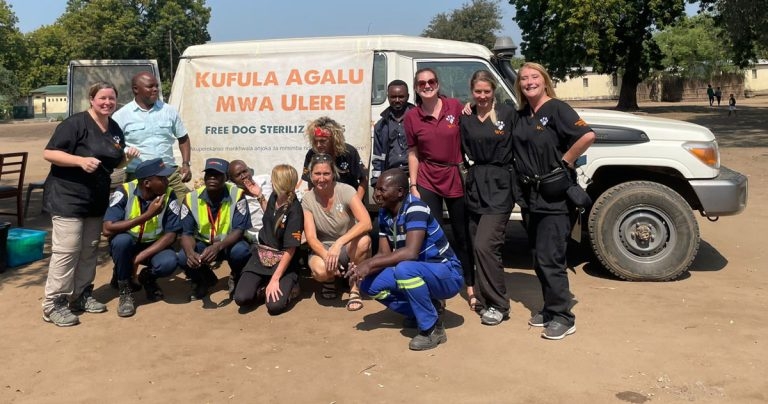20 Sept 2022
Hundreds of animals were vaccinated against the deadly disease following a Conwy practice’s link-up with two charitable groups.

Sarah Heywood (left) with the Mochdre team and local volunteers.
A Welsh practice team has taken its skills to one of the world’s poorest countries to help reduce the spread of rabies there.
Staff from the Mochdre Veterinary Practice in Conwy vaccinated hundreds of animals against the disease in just three days at the Illovo Sugar estate in Malawi.
The work was carried out in support of Mission Rabies, which aims to eradicate the disease globally by 2030, after the practice got involved through the Worldwide Veterinary Service.
The campaign has already seen tens of thousands of dogs in the Malawian city of Blantyre vaccinated and, having had the highest number of child deaths from rabies in the whole of Africa in 2012, there were none at the city’s hospital last year.
Mochdre practice founder Sarah Heywood said her team had been keen to pursue voluntary opportunities for some time and the nearest veterinary cover was three hours’ drive from the estate, putting care beyond the reach of most of the people who live and work there.
Mochdre itself donated thousands of pounds’ worth of antibiotics, medication and heat pads, and provided the equipment needed for the work, although Mrs Heywood conceded working conditions were somewhat different from the norm.
Mrs Heywood said: “We were given a gazebo and we just had to set up as a field station.
“We had none of the usual fancy gadgets and monitors; we had to rely on ourselves to be vigilant and trust that the owners could hold their pets while we injected them.”
Almost 1,000 dogs and cats were given jabs during the operation, with almost 100 being neutered under a philosophy of “no rabies, no babies”. The team also gave treatment to dogs with transmissible venereal tumours – which can be spread when dogs mate – as well as advice for their owners.
Mrs Heywood said: “This is the first time the project was run and it was a real privilege to be involved, as hopefully it will be the first of many, and as people will have seen hopefully the success, they will do it themselves in the future.
“Looking at it in a basic sense, if every person employed on the sugar estate owned a pet, we were involved in vaccinating 10% of the pet population – which is a small drop in the ocean, but could have big ripples.”
During the trip, the team also shared their knowledge with local vet students at the Blantyre SPCA, which provides treatment for animals at the Majete Wildlife Reserve.